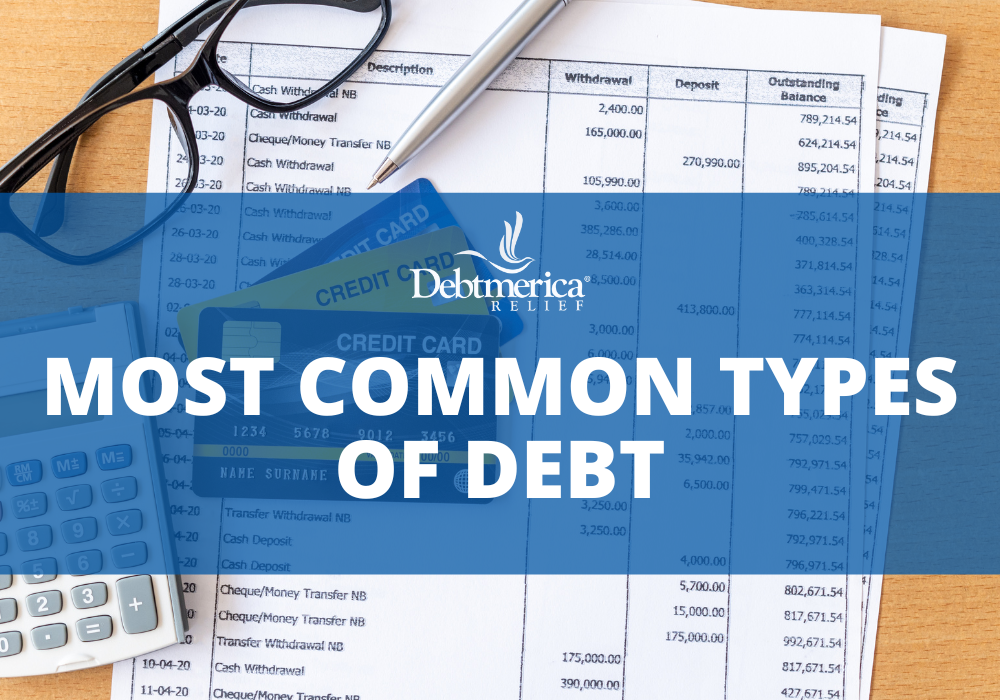Most Common Types of Debt

Debt has become an integral part of many people’s lives. From financing education to purchasing homes and managing emergencies, debt can serve as a helpful tool when used wisely. However, it’s essential to comprehend the various types of debts to make informed decisions about borrowing and managing your finances effectively. In this article, we’ll explore some of the most common types of debts and offer insights into how they work.
Credit Card Debt
Credit card debt is perhaps the most prevalent type of debt, owing to the widespread use of credit cards for everyday expenses. Credit cards are revolving accounts so you can carry a balance each month. Outstanding balances accrue interest, which can lead to a cycle of debt if not managed carefully. Depending on your credit score, your credit card, and credit history, your interest rate can range from 10 percent to 30 percent. Unlike other loans, credit cards are considered unsecured loans, which means you do not need to provide any collateral in case you can’t pay off your debt. While credit card debt does not affect your taxes, it does play a major role in determining your credit score. Making consistent monthly payments can increase your score while opening too many accounts can decrease it.
Student Loan Debt
Student loan debt is often incurred to finance higher education, including tuition, books, and living expenses. These loans can come from both government and private sources, each with different terms and interest rates. Typically, the term length is 10 years. Student loan interest is tax-deductible if you decide to itemize your deductions. In 2023, you can deduct up to $2,500 if you meet certain income requirements. Like most other debts, student loan payments affect your credit score.
Mortgage Debt
A mortgage is a long-term (15-30 years) loan used to purchase real estate, typically a home. Mortgages are secured by the property itself, allowing lenders to repossess the property if the borrower fails to make payments. Different types of mortgages, such as fixed-rate and adjustable-rate mortgages, come with varying interest structures. Like student loan interest, mortgage interest on your primary residence can be deductible if you itemize your deductions. In 2023, you can deduct mortgage interest paid on the first $750,000 in mortgage debt, or $375,000 for married people filing separately. While mortgage debt is not factored into your credit utilization rate, making payments on time will help your credit score.
Auto Loan Debt
Auto loans enable individuals to purchase vehicles by borrowing money from lenders. These loans come with varying interest rates and repayment periods, typically 3-6 years. Like a mortgage loan, auto loans are secured installment loans, which means the lender can repossess the vehicle if you stop making your payments. Auto loans do not affect your taxes, but they can affect your credit score.
Medical Debt
Medical debt arises when individuals are unable to cover the costs of medical treatments, procedures, or hospital stays. While not a traditional form of borrowing, medical debt can become a burden if left unpaid. Medical debt is not secured, and repayment usually depends on your hospital. If you itemize your deductions, you can usually deduct any qualified medical expenses that exceed 7.5% of your adjusted gross income (AGI). As of 2022, credit bureaus offer a one-year grace period before medical debt shows up on your credit report. If the debt is $500 or more and is paid off after it shows up on your credit report, it will be removed. As of 2023, medical debt that goes to collections with an initial balance under $500 is excluded from credit reports.
Conclusion
Debt, when managed prudently, can be a helpful tool for achieving important life goals. However, it’s crucial to understand the various types of debts and their implications before taking on financial obligations. Wisely managing debts involves responsible borrowing, making timely payments, and exploring strategies to minimize interest and fees. By maintaining a clear understanding of the most common types of debts and their potential impact on your financial health, you can make informed decisions to secure a more stable and prosperous future.
If you need help with debt, contact us for a free consultation.




